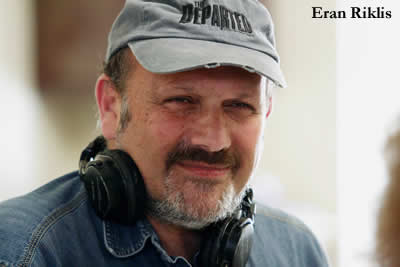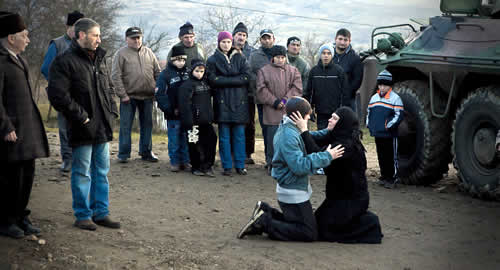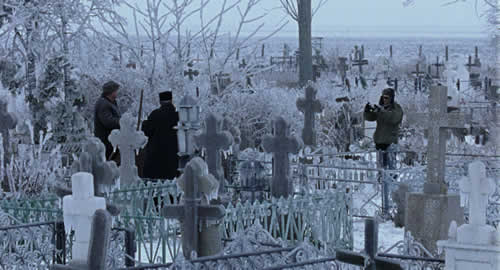 The Human Resources Manager of Jerusalem’s largest bakery is in trouble. He is separated from his wife, distanced from his daughter and stuck in a job he hates. When one of his employees, a foreign worker, is killed in a suicide bombing, the bakery is accused of indifference, and the HR Manager is sent to the victim’s hometown in Romania to make amends. Far from home, on a mission to honor a woman he didn’t even know but has somehow grown to admire, the HR Manager rediscovers his own humanity and his ability to truly care for human resources.
The Human Resources Manager of Jerusalem’s largest bakery is in trouble. He is separated from his wife, distanced from his daughter and stuck in a job he hates. When one of his employees, a foreign worker, is killed in a suicide bombing, the bakery is accused of indifference, and the HR Manager is sent to the victim’s hometown in Romania to make amends. Far from home, on a mission to honor a woman he didn’t even know but has somehow grown to admire, the HR Manager rediscovers his own humanity and his ability to truly care for human resources.
Eran Riklis, director of The Human Resources Manager was born in Jerusalem in 1954 and grew up in Canada, the US, Brasil and Israel. He is a Graduate of The National Film School, Beaconsfield, England.
Eran Riklis directed over 300 commercials, promos and corporate videos, many TV dramas and TV series, and directed and produced 9 feature films, including Lemon Tree (2008 Berlin International  Film Festival Audience Award), The Syrian Bride (Montreal Grand Prix, Public, Fipresci & Ecumenical Awards, Locarno Public Award, Ghent Public and Script Awards, Bastia Best Actor, Script and Jury Awards, Auxerre Grand Prix), Vulcan Junction (1999 Haifa Best Film Award) and Cup Final (Official Selection, Berlin and Venice Film Festivals, won prizes in Salerno, Valencia, Montpellier).
Film Festival Audience Award), The Syrian Bride (Montreal Grand Prix, Public, Fipresci & Ecumenical Awards, Locarno Public Award, Ghent Public and Script Awards, Bastia Best Actor, Script and Jury Awards, Auxerre Grand Prix), Vulcan Junction (1999 Haifa Best Film Award) and Cup Final (Official Selection, Berlin and Venice Film Festivals, won prizes in Salerno, Valencia, Montpellier).
Bijan Tehrani: How did you first encounter the book that you based this film on?
Eran Riklis: It was a normal encounter in the sense that my producer read the book first; we had never worked together before, but he told me that he would love to work with me and he felt that he had found my next project. I read the book, met the writer, and very quickly had discussions with the producer and my writer and decided that this could in-fact be my next film. The book had everything that I was looking for and it had things that I could identify with and make them my own. The Human Resources Manager dealt with the immediate issues of Israel and the Middle East.
BT: Are there any connections from The Human Resources Manager to your other movies?
ER: Well for me there is a connection: those films are always labeled as political films. I have always denied the fact that I am a political filmmaker, what I mean is that I really try to make relevant and conscious films. I think that I live in a country and in a region where you have to be well aware of what is going on around you, we don’t have many voices and much news. You have to stay true to the issues that bother you personally and also to the people in this region and sometimes you can touch on issues that effect people everywhere. So The Human Resources Manager is different in the sense that it is a film that is based on political situations but you can also see the issue of the foreign workers, which is a very human and very painful issue. So those elements were enough for me to move ahead with the story because these issues connect me to the people around me; all my films are about people confronted with bureaucracy and people that are dealing with the global political and social situations and this film fits the mold.
 BT: How did you go about casting The Human Resources Manager?
BT: How did you go about casting The Human Resources Manager?
ER: The director’s job half done when you have the right cast. I put in a lot of time and effort to find the right actors, and I also trusted my intuition—sometime you just need to get the right feeling about an actor. The issue with the casting is that I was split between Israel and Romania; I suddenly realized that there were many Romanians living in France. The character of the ex-husband is a Romanian actor living in France, and the actor who plays the boy is actually an American French kid that I found. Almost by mistake, and he also learned how to speak Romanian. With actors, the main thing for me is that they have some sort of secret and to have actors that don’t give away their secrets in the first part of the film. You need to have actors that the audience is intrigued by, and then of course the story takes it wherever it takes you.
BT: How did you go about directing the actors in this film?
ER: When I went to school in England, I took a class on how to direct the actors and I had two different tutors who had different approaches in terms of how you direct actors. One was of the school of digging in with your actors and going into all of the psychological levels and really trying to open up your actor in order to get what is demanded of them by the script. The other tutor said that actors are just pawns on a chessboard and that you just move them around and you don’t need to know that much. So I feel that these two ideas were useful to me and I developed my own style. I move the actors around and use both methods in order to reach those places that the script needs you to reach. What you really try to do is respect and suspect; you want to keep your distance and at the same time you need to become their best friend. I try to keep the set fresh and that is a matter of being well prepared and well thought-out and you also do not want to over-rehearse and force the actors to reach their peak before those pivotal moments of filming.
my own style. I move the actors around and use both methods in order to reach those places that the script needs you to reach. What you really try to do is respect and suspect; you want to keep your distance and at the same time you need to become their best friend. I try to keep the set fresh and that is a matter of being well prepared and well thought-out and you also do not want to over-rehearse and force the actors to reach their peak before those pivotal moments of filming.
BT: Please tell us about the visual style of The Human Resources Manager?
ER: I found in my recent films that I fell in love with the approach of more-is-less; I wanted to try to simulate the style of the human vision. I think I tried to find the right lenses and the right distance of the camera, just the right flowing approach and to get the audience involved very physically. We don’t use many fancy shots and the camera is there to just tell us where we are and where the film is going. We also respect the fact that this is a bit of a road movie and it is a lot about the landscape and we found a way to keep it simple and keep it close.
BT: Do you have any upcoming projects?
ER: Since I finished The Human Resources Manager, I have actually finished a new film called Playoff. I had a very busy year because I finished Human Resources around April or May and then I filmed this one in the summer. This is a film set in Germany and it is about a basketball coach who was a Holocaust survivor and has to make a very difficult decision to go back to the country that murdered his family. The film stars Danny Huston and it is pretty much done; this is a year of two films for me and it is a pretty nice feeling.
THE HUMAN RESOURCES MANAGER opens in Los Angeles on Friday, March 11. THE HUMAN RESOURCES MANAGER will open at the Regent Theatre (Los Angeles), Laemmle’s Fallbrook 7 (Encino) and South Coast Cinemas (Laguna Beach).

